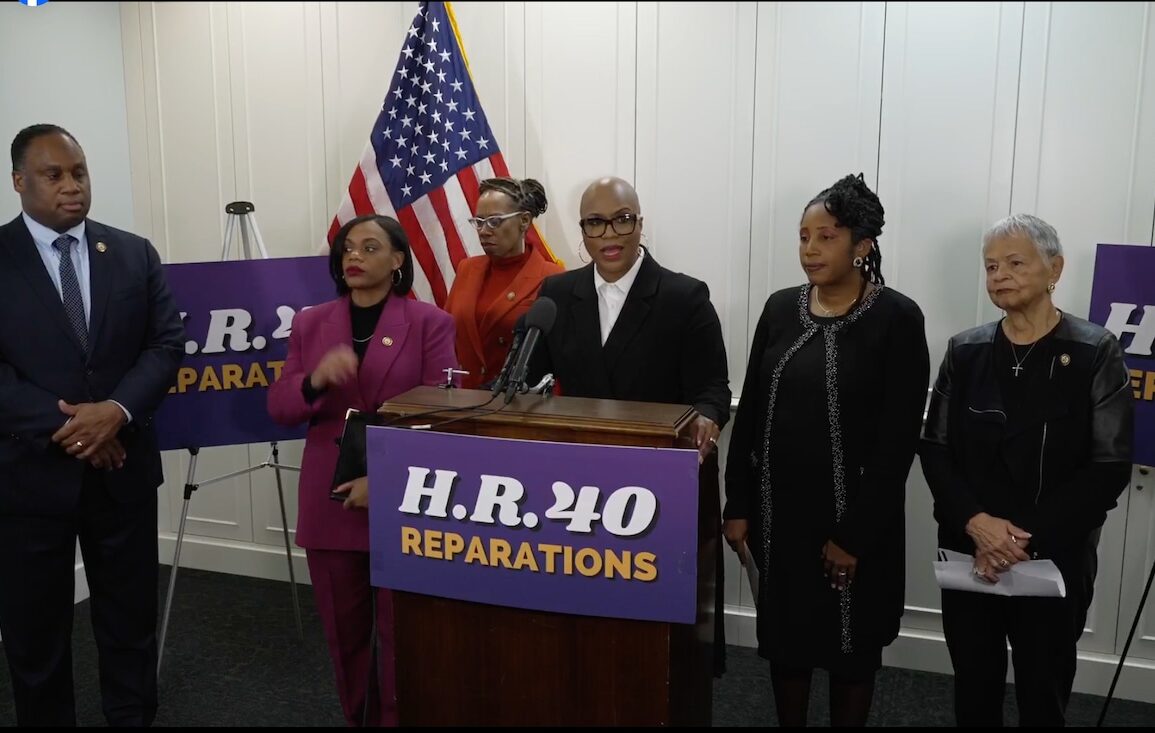
U.S. Rep. Yvette Clark didn’t have to look far on Wednesday for the legacy of segregation and discrimination in the United States.
They were standing right behind her.
“Every single member in back of me, their mothers were born in segregation,” Clark, D-NY., said during a news conference at the U.S. Capitol. “Our mothers — not great-grandmothers — were born in policies that followed chattel slavery.”
Clark, the chairperson of the Congressional Black Caucus, joined Massachusetts U.S. Rep. Ayanna Pressley, and a coalition of Black lawmakers, as Pressley refiled a long-sought bill that would finally establish a national commission to study reparations for the descendants of enslaved Americans and the economic discrimination that resulted from it.
“To be clear, this bill is not a symbolic gesture, but rather a meaningful step for repairing the deep structural injustices that continue to harm black communities today,” Pressley, D-7th District said.
U.S. Sen. Cory Booker, D-N.J., is sponsoring a companion bill on the other side of Capitol Hill, Pressley, said, adding that her proposal has so far attracted the support of more than 70 of her colleagues.
The timing of the announcement, during this year’s observance of Black History Month, and ongoing attacks on diversity policies by the Trump White House, underscored the urgency of the “long overdue” commission, Pressley continued
“What a critical inflection point in America. The moment could not be more urgent,” the Boston Democrat said. “There is no better time to introduce this bill than during Black History Month, a time when we reflect on our history, our struggle, and our collective power. And I’ll say it is also not only about Black history, but it is about Black futures.”
Efforts to create the study commission date to 1989, when the late U.S. Rep. John Conyers, D-Mich., introduced the first version of the legislation.
Conyers, who died in 2019, did not live to see his proposal signed into law.
Nor did U.S. Rep. Sheila Jackson Lee, D-Texas., who shepherded the bill through the last session of Congress. Lee died on July 19, 2024, in Houston.
Lee’s daughter, former U.S. Rep. Erica Lee Carter, D-Texas, who served out the balance of her mother’s term for the 18th Congressional District seat in the Lone Star State, was on hand Wednesday for the news conference.
“This fight against injustice is personal to her and me,” Lee Carter said, referring to Pressley. “[The bill] is long overdue and even more necessary under this administration, as hate is fomented, discrimination is promoted, and code words are used to bring out the worst in our fellow Americans.”
Lee Carter paid tribute to Conyers, and his efforts to advance the legislation, saying he “understood, from the nation’s very founding, the enslaved of African descent were shut out, and disparity was written into our Constitution.”
A 2024 report by the Brookings Institution found that, while Black wealth is growing overall, the racial wealth gap also has increased.
Between 2019 and 2022, “median wealth increased by $51,800, but the racial wealth gap increased by $49,950 — adding up to a total difference of $240,120 in wealth between the median white household and the median Black household,” the study found.
Lee Carter said Wednesday that she’s traveled the country, talking with a wide variety of people, working to convince them that the reparations panel is not a “check or a useless exercise.”
“They and we know that we are nothing without a record and official documentation, you cannot right wrongs without an accurate record of those wrongs,” she said, comparing the commission to filing an insurance claim.
The bill asks the nation “to look under her hood and identify what has been wrong for hundreds of years and determine if there are ways to repair [it].”
U.S. Rep. Bonnie Watson Coleman, D-N.J., offered an additional framing, drawing an intergenerational line of continuity between Conyers, Jackson Lee, and Pressley.
“So I’m grateful to my little sister Ayanna for picking up this legislation from the late, great Sheila Jackson Lee,” Watson Coleman said. “This is Representative Lee’s legacy. And we represent her legacy … Ayanna carries on that legacy at a time when bravery and commitment to justice are needed now more than ever.”
Pressley made clear Wednesday that the effort will extend long past Black History Month. She’s in it to win it.
“I think it’s really important in these times that we call a thing a thing. We’re in a moment of anti-Blackness on steroids, and we refuse to be silent,” she said. “We will not back down in our pursuit of racial justice.”
” … So today, we have a choice. You can continue to uphold an unjust status quo, or we can work actively to disrupt it,” she said.
Wednesday’s event also comes as cities and states across the nation, including Boston, are considering, or have approved, reparations for their Black citizens.
During an appearance on GBH News’ “Boston Public Radio” program on Wednesday, Boston Mayor Michelle Wu, who is up for reelection this year, was asked about her city’s efforts to improve minority and women contracting.
“What Boston represents and what we are such clear proof of is that when you look at the reality of our communities,” Wu, who faces fellow Democrat Josh Kraft at the polls this year, said.
“When you look at disparities that exist between outcomes on health and longevity or household income or home ownership, it’s very clear that historically, policies have led us to this point,” she continued. “And that policies are needed to ensure that we’re all benefiting from the full participation of our entire community, economically and otherwise.”



